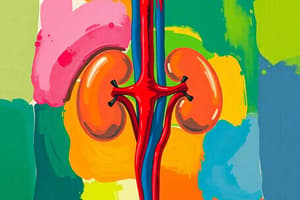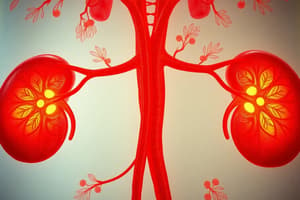Podcast
Questions and Answers
What is the primary function of nephrons in the kidneys?
What is the primary function of nephrons in the kidneys?
- Regulating body temperature
- Filtering blood and eliminating waste (correct)
- Producing red blood cells
- Transporting oxygen to cells
In response to consuming salty food or losing water through sweating, what happens to urine concentration?
In response to consuming salty food or losing water through sweating, what happens to urine concentration?
- Rises (correct)
- Stays the same
- Decreases
- Becomes hypotonic
Which organs are considered the main excretory organs responsible for producing and eliminating urine?
Which organs are considered the main excretory organs responsible for producing and eliminating urine?
- Spleen, pancreas, and gallbladder
- Liver, large intestine, and skin
- Kidneys, ureters, and urinary bladder (correct)
- Heart, lungs, and kidneys
Where are the kidneys located in the body?
Where are the kidneys located in the body?
Which of the following is NOT a function of the kidneys?
Which of the following is NOT a function of the kidneys?
What is the primary nitrogenous waste expelled by the excretory system?
What is the primary nitrogenous waste expelled by the excretory system?
Which blood vessel carries oxygenated blood from the lungs to the heart?
Which blood vessel carries oxygenated blood from the lungs to the heart?
What is a common circulatory system problem caused by plaque accumulations in the arteries?
What is a common circulatory system problem caused by plaque accumulations in the arteries?
What prevents blood from flowing backward in varicose veins?
What prevents blood from flowing backward in varicose veins?
What is the function of the circulatory system?
What is the function of the circulatory system?
Before the development of complex kidneys, what mechanism did microorganisms and invertebrate animals use to eliminate metabolic wastes?
Before the development of complex kidneys, what mechanism did microorganisms and invertebrate animals use to eliminate metabolic wastes?
Which organ system uses more basic and primitive mechanisms compared to the mammalian kidney and urinary system to eliminate metabolic wastes?
Which organ system uses more basic and primitive mechanisms compared to the mammalian kidney and urinary system to eliminate metabolic wastes?
What is the primary function of the kidneys in the excretory system?
What is the primary function of the kidneys in the excretory system?
How do the kidneys contribute to the skeletal system?
How do the kidneys contribute to the skeletal system?
What can happen if there is a malfunction in the excretory system?
What can happen if there is a malfunction in the excretory system?
In addition to clearing waste from the body, what other important function does the excretory system serve?
In addition to clearing waste from the body, what other important function does the excretory system serve?
Which organ is responsible for adding waste products, like urea, to the urine in the human excretory system?
Which organ is responsible for adding waste products, like urea, to the urine in the human excretory system?
How does the excretory system contribute to protecting the digestive system?
How does the excretory system contribute to protecting the digestive system?
Flashcards are hidden until you start studying
Study Notes
The Excretory System
- The kidneys and bladder make up the majority of the excretory system in humans.
- The kidneys filter the blood to prevent the buildup of toxic substances.
- The excretory system serves purposes beyond clearing waste from the body, including preserving internal homeostasis.
- The muscular system and skeletal system impact specific excretory system components.
Functions of the Excretory System
- The excretory system protects and balances the digestive system.
- It regulates the body's fluid balance, maintaining adequate salt and water levels.
- It produces hypotonic urine to remove extra water when present.
- Urine concentration rises to maintain body fluid osmolarity when eating salty food or losing water through sweat.
Organs of the Excretory System
- The kidneys, ureters, and urinary bladder are the body's main excretory organs that produce and eliminate urine.
- Other organs like the liver, large intestine, and skin are also necessary to expel particular metabolic wastes.
The Kidneys
- The kidneys are two bean-shaped organs on either side of the spine in the abdomen, below the diaphragm.
- They are composed of numerous nephrons, which are structural and functional subunits.
- The primary function of nephrons is to filter blood and eliminate waste.
- Each nephron is located between the inner medulla and the outer cortex of the kidney, with specific activities taking place at each location.
Anatomy of the Kidney
- The kidney has an inner region called the renal medulla and an outer region called the renal cortex.
- The renal medulla contains connective tissue renal columns that divide the 5-8 renal pyramids.
- Each pyramid ends in a renal papilla and produces urine.
Comparison with Other Excretion Systems
- Microorganisms and invertebrate animals have excretion systems that use more basic and primitive mechanisms to eliminate metabolic wastes.
- Cell surface or cell membrane permits the passage of wastes in single-celled organisms.
Studying That Suits You
Use AI to generate personalized quizzes and flashcards to suit your learning preferences.




